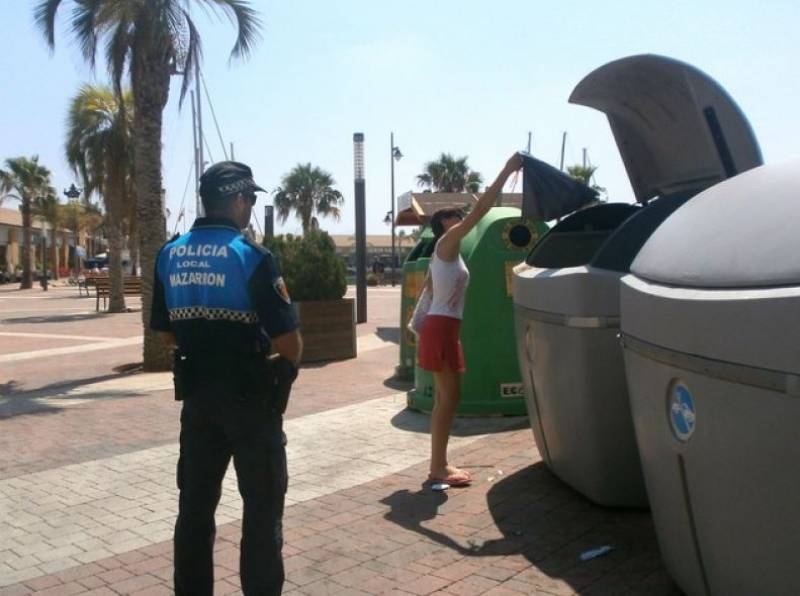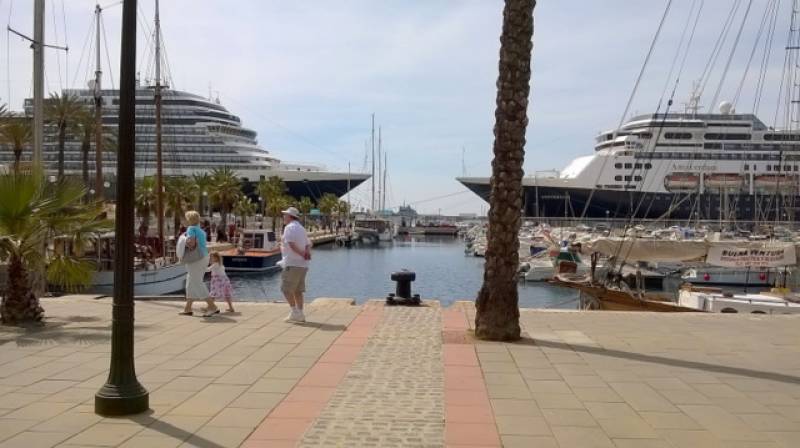
To be listed on the CAMPOSOL TODAY MAP please call +34 968 018 268.
article_detail
Spanish News Today Editors Roundup Weekly Bulletin Oct 4

TOP STORIES: "Vapes, cannabis and more included in major overhaul of Spain’s health service" & "Bin charges for homeowners set to soar throughout Spain in 2025"
Happy Friday, all! Firstly, a massive thanks to everyone who renewed their subscription for the next round of these Editor’s Roundup Weekly Bulletins over the next year. Your support really means a lot to us.
So, what have we got for you this week, on the week when Iran and Israel are getting into it over Lebanon and people at the UN are using phrases like ‘World War III’ (not to scare you)?
Well, let’s keep it local. After their lengthy summer holidays, the Spanish government has really put the head down and our fearless leaders are busy at work on all sorts of reforms and new legislations.
This week, they’ve announced new rules about everything from pets to public transport, and while many of the proposals are intended for the common good, many of them are sure to get people’s hackles up – not to mention punching a rather big hole in their pockets. Let’s begin:
iva fever
If you’ve done the shopping at all this week, you may have noticed it already – dozens of basic grocery items like olive oil, bread, pasta, milk, eggs, cheese, fruit and veg have gone up in price since October 1.
This is because the crisis measures introduced in response to the invasion of Ukraine and the subsequent inflation surge are being gradually rolled back.
 So from this month, the VAT rate on olive oil and basic foodstuffs will rise from 0% set in July up to 2%. In addition, the tax rate applied to seed oils (such as sunflower oil) and pasta will rise from the current 5% to 7.5%.
So from this month, the VAT rate on olive oil and basic foodstuffs will rise from 0% set in July up to 2%. In addition, the tax rate applied to seed oils (such as sunflower oil) and pasta will rise from the current 5% to 7.5%.These slightly higher VAT rates will remain in force until December 31 but from January 1 next year, all prices will return to what they were before the inflationary crisis. This means that Value Added Tax (‘impuesto sobre el valor añadido’ in Spanish, or iva for short) on essential foodstuffs will jump up to 4%, while VAT on pasta and seed oils will be set at 10%.
The only exception is olive oil, which will be permanently set at 4% (it was previously at 10%) after recently being given the status of basic food.
Pet peeves
Spain’s ground-breaking Law on the Protection of Animal Rights and Welfare came into force on March 29 last year. Most of the regulations were enforced within six months, but pet shops were given a year to adapt to a new rule that specifically affects them.
That grace period ended on Sunday September 29.
 From this date forward, pet stores aren’t allowed to sell dogs, cats or ferrets. Nor are they allowed to display these animals in their shops. Going forward, only officially registered breeders will be allowed to sell dogs, cats and ferrets and all sales must be reported to the Pet Registry within three working days.
From this date forward, pet stores aren’t allowed to sell dogs, cats or ferrets. Nor are they allowed to display these animals in their shops. Going forward, only officially registered breeders will be allowed to sell dogs, cats and ferrets and all sales must be reported to the Pet Registry within three working days.This is certainly good news for our furry friends, as too many young puppies and kittens spent the first months of their lives stuck in glass cages in pet shops. Stores found to be in breach will be issued fines ranging from 50,001 to 200,000 euros.
Total garbage

We hope you’re sitting down before we reveal this next little nugget of news, because it’s causing a major stink up and down the country, and it’s not just consumers who are angry. Local councils and town halls are fuming after being told that they will need to start charging homeowners the full price for waste collection services from next year – and it’s really going to cost us.
To put things into perspective, most households only pay around 40% of what it actually costs to collect, transport and treat the rubbish left in municipal bins. Thanks to a new EU rule, councils will now have to pass on 100% of the operating costs by April 2025 at the latest.
Each municipality is unique and there is no estimate that can be applied to all of them, but according to estimates from the sector, for a current average bill of 120 euros per year (which represents 40% of the service costs), households would have to pay 180 euros more: 300 euros in total.
But there is a plus point: residents will be able to offset the bin charges by earning a sort of ‘bonus’ each time they recycle. Monitoring this desirable environmentally-friendly behaviour isn’t going to be straight-forward though, and local councils are pleading with the government to provide some guidance.
Brussels pouts
On the first of this month, there were strikes in Belgium by staff in charge of airport security, cleaning and hospitality, who all undertook a “national demonstration” to demand better pay and working conditions, meaning that flights from Brussels and other airports all had to be cancelled or rerouted.
As one airport spokesperson put it, “The deficit of security staff is too large to ensure safe operations.”
The striking workers said they had repeatedly tried to get employers to listen to their concerns about inappropriate work temperatures, expensive parking and overpriced and limited facilities for staff, but to no avail.
An estimated 1,000 cleaners, security staff and hospitality workers from different trade unions hosted a demonstration in the heart of Brussels, and they were joined by comrades from Spain and other European countries.
For those looking for a sunny getaway from Brussels to Spain it was a nightmare of a day’s travel, but at least some of the flights headed to Murcia, Alicante and Almería weren’t completely cancelled, and instead just got shuffled over to Ostend Airport.
Flights that were supposed to leave at the crack of dawn got moved to a slightly more civilised time, and Brussels kindly arranged a bus transfer for affected passengers.
If it’s not queues for passport control making life hard for passengers it’s strikes by airport staff. One more reason just to take the scenic route and drive down in a campervan?
Murcia
 Cartagena is gearing up for quite the influx of visitors this October, as more than 35,000 cruise tourists are set to descend on the city. With 29 cruise ships scheduled to dock throughout the month, including heavyweights like Royal Caribbean’s ‘Oasis of the Seas’ and the ‘Norwegian Epic’, it’s going to be a busy one for the local economy.
Cartagena is gearing up for quite the influx of visitors this October, as more than 35,000 cruise tourists are set to descend on the city. With 29 cruise ships scheduled to dock throughout the month, including heavyweights like Royal Caribbean’s ‘Oasis of the Seas’ and the ‘Norwegian Epic’, it’s going to be a busy one for the local economy.These floating cities are a good money maker for Cartagena’s businesses, and with the city’s rich history and culture, tourists have plenty to explore. Plus, the local PorTuArte craft fair will be running at the cruise terminal every time a ship arrives, offering a bunch of handmade goodies for tourists to pick up.
A bit of shopping therapy to go with the sightseeing for the cruise passengers and a clever tactic by Cartagena Council to squeeze the most they can out of them. Everybody wins.
Talking of shopping in Cartagena, the Espacio Mediterráneo shopping centre has also had a recent facelift, with over 5 million euros poured into upgrades, the latest of which is a brand-new children’s play park outside in the car park area.
This kiddy park comes complete with a wooden submarine in honour of local legend Isaac Peral, who invented the first electric-powered sub, adding a fun element for the kids and also tying in with the area’s cultural heritage, because why not mix a bit of history into your shopping trip?
With improved accessibility, green spaces and even shaded parking (a godsend during those hot Spanish afternoons), the centre’s become a real destination for families and tourists alike.
Speaking of spending money (but in a not-so-fun way), have you heard about the latest scam doing the rounds in Spain? Brace yourselves: apparently, Taylor Swift is “trapped” in Murcia and needs 800 euros to get home! Poor thing.

Yep, this message has gone viral and has sparked both jokes and warnings from cybersecurity experts. Some genius decided to impersonate the multimillionaire international superstar in an attempt to swindle people out of their hard-earned cash by claiming she needed some pocket change from a total stranger to buy a plane ticket.
Naturally, social media had a field day with it, with people creating parodies like one claiming the Pope is stranded in Albacete and needs cash. It reminds me of the story that came up about a year ago when a woman in Granada handed over 170,000 euros to someone she had never met who claimed he was Brad Pitt, and who also happened to be in love with her.
While such scams might be hilarious on the surface, authorities are warning people to stay alert as frauds like this are becoming more common and anyone can fall victim to a con artist. So, no, Taylor Swift is not stuck in Murcia, and no, she doesn’t need your money. Save your euros for that Cartagena craft fair instead!
In Murcia city, the Enrique Roca football stadium is getting some high-tech upgrades in preparation for the international match set to take place on October 12 when Spain play Denmark in the Nations League qualifier.
Fans can now see it all in super-bright LED glory. The stadium’s lighting system has been given a complete overhaul, swapping out old floodlights for shiny new LEDs, which means less electricity consumption and way better visuals, perfect for those all-important 4K broadcasts.
The game’s already sold out, and Murcia is expecting to be in the spotlight, with both national and international eyes on this event. It’s not just about the lights, though; the stadium has undergone a full makeover, with murals and a deep clean, all to impress the fans who’ll be flocking in (and, of course, UEFA, who flagged up the stadium’s poor lighting on their snagging list ahead of the game).
Enrique Roca has already been ruled out as a possible host for World Cup 2030 matches, but if all goes smoothly next weekend and UEFA are satisfied with the quality of the ground, we could potentially be seeing more high-stakes international games played in Murcia.
As ever, there’s plenty to do this weekend and throughout the month of October in Murcia, not least of which is the annual fiestas in Alhama de Murcia which kick off today!
See our EVENTS DIARY for more events and activities coming up soon in the Region of Murcia:
Spain
Let’s start our Spain section with the positive stuff. For a few years now, Spain has been scrambling to catch up with other European countries like Germany and Italy that have legalised the use of medicinal marijuana in certain chronic cases, such as for the treatment of cancer or epilepsy.
Spain has also adjusted the legislation slightly, but none of the major reforms have really stuck. Now though, as part of a massive overhaul of the public health system (which we’ll delve into a bit later), the Ministry of Health wants to expand the use of cannabis in its ‘magistral formulas’ – oils based on active ingredients of cannabis – excluding the use of marijuana flowers and buds.

These cannabis oils have been used in other countries with great success and if the modification is accepted in Spain, they could help hundreds of people suffering from Multiple sclerosis, undergoing chemotherapy and those with chronic refractory pain.
This isn’t the only change afoot when it comes to the health service. Following the legalisation of abortion for younger women in this country without parental consent and the government’s guarantee that pregnant women would be able to avail themselves of this service through the public health system, a recent study found that 81.4% of patients are still paying for the procedure in private clinics.
To ensure that all women have access to safe and legal abortions in public health, the Ministry is pushing ahead with creating a registry of medical practitioners who conscientiously object to carrying out pregnancy terminations.
It’s hoped that this registry will prevent entire hospital units from declaring themselves objectors and refusing to perform abortions.
Also part of the overhaul is the long-standing Anti-Tobacco Plan, another initiative that is constantly talked about but never seems to result in any real changes. But this autumn, the government is determined to use it to make all sorts of changes, including banning single-use e-cigarettes or vapes, along with flavoured vapes. They also plan to introduce generic packaging for cigarettes and pouches of tobacco, similar to what already happens in the UK.
Controversially, the draft includes a “recommendation” that smoking not be allowed in vehicles carrying children or pregnant women. However, the government team has acknowledged that proposals along these lines have been met with fierce opposition in the past and that an all-out ban would be very difficult to enforce.
Sadly, that’s kind of where the good news ends, as most of the other changes will likely impact our pockets one way or another.
For instance, one measure introduced back in the day to mitigate the cost of living crisis was the nationwide public transport discounts, which allowed regular commuters use medium-distance and local trains for free and applied a 50% discount to long-distance train travel.
This bonus will remain in play until December 31 but Spain’s Minister of Transport reckons it should be scrapped in the New Year in favour of a means-tested system. He also argues that more money needs to be spent on improving the country’s public transport system overall, even if this means charging passengers more.
“If the bus user who pays 36 cents to use it is told that they can pay 70 cents but with better service, they will surely say that they prefer it,” he predicted.
“I am one of those who believe that we will gain users in public transport, not based on the price of the ticket, which is already quite low, especially compared to private vehicles, but if we offer users more quality and frequencies.”
Now, getting rid of the public transport discount is not just up to the Transport Minister (thankfully), but if it goes in the way of many of the other crisis measures, the policy’s days could be numbered.
This next change has both positive and negative aspects, and impacts people who like to sell their things online via second-hand platforms like Vinted, Wallapop and Milanuncios. These sites have become household names in Spain for shoppers hoping to bag a bargain, and it’s a nice little nixer to bring in a few euros for some people.
 However, the Spanish government has now announced that it will be fining sellers who fail to declare their profits from second-hand sales. But what does this mean for you, the average online seller? Do you need to report your sales, and if so, how do you go about it?
However, the Spanish government has now announced that it will be fining sellers who fail to declare their profits from second-hand sales. But what does this mean for you, the average online seller? Do you need to report your sales, and if so, how do you go about it?In a nutshell, the Treasury requires individuals who sell more than 30 items per year for a value of more than 2,000 euros to pay taxes on their sales. This affects only a small percentage of users, with Wallapop estimating that only 1% of its users reach this limit.
But essentially, if you sell items at a loss i.e. for less than you bought them for in the first place, this does not have to be included on your income statement.
Alicante
In a huge win in the fight against organised crime, Spanish police have arrested a 33-year-old Irish gangland figure with close ties to the notorious ‘The Family’ cartel in Alicante.
The suspect, who has a long and violent history of involvement in organised crime, is accused of being involved in a high-profile murder back in Ireland and is expected to face charges related to drugs and firearms in a Spanish court.
The arrest is a significant blow to The Family, which has emerged as a major player in organised crime in Ireland. The cartel, run by two brothers, has surpassed the notorious Kinahan cartel as the leading supplier of drugs in the country.
The exact circumstances of the arrest are not yet clear, but it is believed that the individual, who has a string of convictions for drug offenses, was caught as part of a major drugs bust on the Costa Blanca.
During the summer, we brought you the sad story of Natalia, a chimpanzee who is a long-term resident of the Biopark Zoo in Valencia. Natalia gave birth to a baby girl at the beginning of the year but sadly, the little chimp died from natural causes in February.
But the heartbroken mum refused to part with her baby’s body, and she carried the corpse around with her, day and night, for seven months.

Now, it seems that she has finally accepted her baby’s death and Natalia has allowed zoo workers to remove the dead chimp.
The sight of the forlorn mother cradling her dead infant has made headlines throughout Spain, and the staff at the zoo have been praised for their patient and understanding handling of the situation. Realising that Natalia wouldn’t be parted from her baby until she was ready, they gave the chimp space and allowed the grieving process to follow its natural course.
As a park spokesperson explained, “This is a species where social ties and group cohesion are essential, so all members are affected by these sad events.”
In a move that has sparked controversy among locals and environmental groups, the council in Pilar de la Horadada has given the go-ahead for the development of 1,086 tourist homes on a plot of scrub land in the Lo Monte area.
The project, which will house around 2,700 new residents, has been met with opposition from the ‘Friends of the Sierra Escalona’ group, who argue that the area is already too built up and that the land could be put to better use as a natural green corridor.

Despite the objections, the project has been approved, with the developer, Santamar de la Vega, estimating an investment of 21.7 million euros in building works.
The development has raised concerns about the impact on the local environment and the strain on resources. The area is already densely populated, and the addition of 2,700 new residents is likely to put a strain on local services, including water supply and waste management.
The project is the third time that Santamar de la Vega has sought permission to build in Pilar de la Horadada, and it’s clear that the company is committed to developing the area.
However, it remains to be seen whether the project will ultimately benefit the local community or exacerbate existing environmental and social issues.
Andalucía
 We start our Andalucía section this week with a disturbing tale from Cadiz, where an English teacher has been caught filming his students and even his own children in the nude.
We start our Andalucía section this week with a disturbing tale from Cadiz, where an English teacher has been caught filming his students and even his own children in the nude.The man, who ran an English academy in Algeciras, hid cameras to film students’ intimate areas and his kids playing naked, all of which he gleefully distributed on the dark web.
Police were quickly on the case, arresting 12 individuals across Spain, including this sordid educator. In the raid, they confiscated a mountain of electronic equipment with incriminating evidence.
The victims, aged 13 to 17, were unaware of what was happening, and this whole ordeal has sent shockwaves across the country.
Staying on the topic of crime, a British boxer on the Costa del Sol decided to throw an unscheduled punch into the headlines with a road rage incident that ended in tragedy.
Lewis Briggs, the 24-year-old boxer in question, has been convicted of murdering a Spanish teenager, Ulrich Pérez, in Málaga. Apparently, Ulrich had the nerve to tell Briggs he was driving too fast towards a zebra crossing, and that sent Briggs into a deadly rage.
Armed with a knife, Briggs fatally stabbed Ulrich in a surprise attack, which was all caught on CCTV, making it hard for Briggs to argue his case in court.
While he tried to play it off as an accident, the jury wasn’t having it. His sentencing is expected soon, with at least 15 years in prison on the horizon.
As if that wasn’t enough drama, Andalucía is facing another fight – the continuing battle against nature. With the region’s reservoirs at a pitiful 28.9% capacity, the Junta (the Andalusian government) has thrown down the gauntlet on water usage, extending existing restrictions.
That means no more filling up swimming pools, watering your garden or washing your car unless it’s at a carwash.
On top of that, the government has announced that drought committees will soon meet to discuss even stricter rules, so don’t be surprised if you find yourself showering with a stopwatch in the near future.
It’s all part of an effort to save the Costa del Sol from turning into the Costa del Desert, but with tourism taking precedence, they’re balancing a fine line between preserving water and keeping the tourists hydrated.
On another environmental front in Almería, people are protesting against a company that wants to build a luxury hotel complex with multiple swimming pools right in the middle of one of Andalucía’s last unspoilt stretches of coast.
The site near the Playa de los Genoveses in the Cabo de Gata Natural Park, which was formerly a pig farm, is a developer’s dream and there have been plans to turn it into a posh hotel since 2016. And while locals are up in arms about it, the project now seems closer to approval thanks to some questionable political backing.
The mayor of Níjar is all for it, and the right-wing coalition is pushing the project forward, but thousands of protesters are saying a resounding “No”. Environmentalists are particularly fired up, comparing it to the infamous Algarrobico hotel, another development disaster that was somehow allowed to be built in the protected Cabo de Gata area.
The Genoveses Sin Hotel group has rallied the troops, with protests and a petition that already has over 250,000 signatures to try to stop the bulldozers from ploughing into this pristine land. If you want, you too can sign the petition online at change.org.

You may have missed…
- New research reveals the panda originated in Spain.
The giant panda, an animal synonymous with China, has a surprising origin story — new research has revealed that the panda bear actually originated in Spain, with remains of the animal dating back 11 million years found in the country! - UK police offer 20K reward for information on Brit fugitive in Spain.
A desperate search is underway for a 21-year-old British man who is wanted in connection with a murder investigation in Lancashire. Thomas Dures is believed to be hiding in Spain and police are urging anyone with information about his whereabouts to come forward. - Spanish doctors perform world’s first face transplant on patient whose heart had stopped.
The Bellvitge Hospital in Barcelona has performed the world's first facial transplant from a donor whose heart had stopped. - Ryanair to scrap paper boarding passes next year.
The budget airline says the majority of people flying to Spain and elsewhere now use their phones, so they plan to make paper tickets a thing of the past. - From brink of extinction to thriving—5 Spanish animals make a remarkable recovery.
Thanks to the tireless efforts of conservationists, researchers and governments, five emblematic animals have been given a second chance to thrive and have been pulled back from the brink of extinction in Spain.
And that’s that. Another massive thank you to all of you!
See you next week for more!
Contact Murcia Today: Editorial 000 000 000 /
Office 000 000 000




















